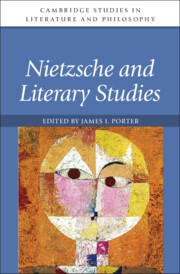Book contents
- Nietzsche and Literary Studies
- Cambridge Studies in Literature and Philosophy
- Nietzsche and Literary Studies
- Copyright page
- Contents
- Contributors
- Abbreviations
- Introduction
- 1 Heraclitus’ Clarity
- 2 Ariadne, or the Mediation of the Image
- 3 Nietzsche’s Centaurs
- 4 Nietzsche on the Task of the Poets in His Middle Writings
- 5 Some Images in Nietzsche’s Zarathustra
- 6 Nietzsche Ludens
- 7 Nietzsche and French Literature from the End of the Nineteenth Century to 1914
- 8 Ecce Mann
- 9 Plant Imaginaries and Human Existence in Nietzsche and Sartre
- 10 The Resources of the Figure
- 11 Nietzsche and Jewish Survival between Sarah Kofman and Jacques Derrida
- Editions and Translations of Nietzsche’s Works
- References
- Index
1 - Heraclitus’ Clarity
From Aphorism to Cento
Published online by Cambridge University Press: 03 May 2024
- Nietzsche and Literary Studies
- Cambridge Studies in Literature and Philosophy
- Nietzsche and Literary Studies
- Copyright page
- Contents
- Contributors
- Abbreviations
- Introduction
- 1 Heraclitus’ Clarity
- 2 Ariadne, or the Mediation of the Image
- 3 Nietzsche’s Centaurs
- 4 Nietzsche on the Task of the Poets in His Middle Writings
- 5 Some Images in Nietzsche’s Zarathustra
- 6 Nietzsche Ludens
- 7 Nietzsche and French Literature from the End of the Nineteenth Century to 1914
- 8 Ecce Mann
- 9 Plant Imaginaries and Human Existence in Nietzsche and Sartre
- 10 The Resources of the Figure
- 11 Nietzsche and Jewish Survival between Sarah Kofman and Jacques Derrida
- Editions and Translations of Nietzsche’s Works
- References
- Index
Summary
Whereas references to Heraclitus’ doctrine of universal flux are abundant in Nietzsche’s works, remarks about Heraclitus’ style are few and appear to be limited to the early works. One striking assessment, given Heraclitus’ reputation of obscurity, features in Philosophy in the Tragic Age of the Greeks: “Hardly anyone has ever written with as lucid and luminous a quality”. The chapter aims at clarifying the relationship between Heraclitus’ fragments, most of which can be described as “aphorisms,” and Nietzsche’s pronouncements about the aphoristic style he himself practices, and at showing why Nietzsche’s systematic reconstruction of Heraclitus’ doctrine takes the form of a cento, a literary form where originally disjoint Heraclitean aphorisms are brought together in a doxographic recomposition that makes of Heraclitus, at the cost of some important tweakings, the tragic, Dionysian philosopher he never ceased to be in Nietzsche’s eyes – as clear and as obscure as Nietzsche himself.
- Type
- Chapter
- Information
- Nietzsche and Literary Studies , pp. 16 - 36Publisher: Cambridge University PressPrint publication year: 2024

